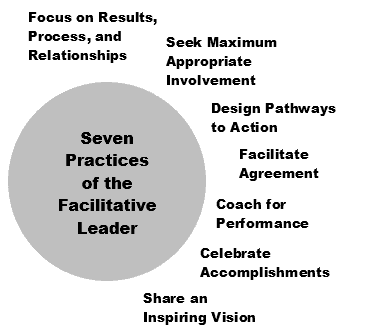Facilitation – What it Means and What it Does
Facilitation; it’s an odd word that has several connotations depending on who you ask. Of course, attempting to define facilitation results in the following vague answer of “the action of facilitating something”. Well, that’s not very helpful, so now we have to break down further to its verb form. So, what does it mean to facilitate? The definition is to “make (an action or process) easy or easier”. Are you getting any closer to understanding what facilitation means, and more importantly what it means in the context of leading an organized session?
Facilitation as a Service
If we consider a leader as a facilitator (among many other skills and duties), they must design and manage change by tapping into the power of participation. However, when faced with important stakeholder meetings or crafting a Strategic Plan, the CEO, Manager, or Team Lead should not be burdened with the task of facilitating such an important and necessary discussion. They should be an active participant in the expected robust conversation. This is why an independent facilitative leader is the best option to achieve the desired results.
This article focuses on the work of an independent Facilitator and how their role can avoid the pitfalls of distraction from the main topic, time management and inappropriate personal investment on certain topics of debate when a neutral position is required. A Facilitator has no vested interest in the outcome, and is only there to carry the group to a desired conclusion. Whatever the conclusion, it is not within the scope of the facilitator’s role.
The Role of an Independent Facilitator
An Independent Facilitator is hired by an organization to do the following:
- Keep the group on task and on time – avoid “exit ramps”
- “Prime the pump” of creativity & possibility – ask the question “what if…?”
- Ask deep and sometimes uncomfortable questions – why? what else?
- Capture thoughts and ideas – take copious notes on not only what’s said, but not said
- Present a summary report
- Keep the day(s) light and engaging
An organization’s role in these gatherings is the following:
- Participate in the conversation
- Engage in the workbook exercises (if a workbook is being used)
- Ask questions – mainly to each other
- Commit to “ownership” of work going forward
- Debrief by asking the questions “what worked?”, and “what could have been improved?”
Working from home? Check out this post to learn more about workplace culture virtually.
Interaction Associates Inc., an innovator in Facilitative Leadership education, illustrates how Facilitative Leadership is organized around Seven Practices for involving and empowering others.

Focus on Results, Process, and Relationships – The independent facilitator must balance these three metrics in conducting any gathering where there is an expected outcome by the group. While results are important, they cannot be achieved at the expense of process improvement or damaging relationships. The facilitator must ask the question “Are the results achievable with the current processes in place and the right people in the right roles?”
Seek Maximum Appropriate Involvement – Everyone wants input into decisions that will affect their workplace and / or workload, but many are shy or reticent to add their voice. This is where the skill of an independent facilitator comes in. They make strategic decisions about when and how people can best participate. They do not cajole or force anyone to comment by putting them on the spot. People listen, absorb, and reflect information in different ways, so a skilled facilitator allows people to find their voice at their own pace. While maximum participation is the goal, this is not at the expense of dominating voices who intend to control both the narrative and the outcome. This is where appropriate comes in, and the facilitator must manage all participants in having an equal voice.
Design Pathways to Action – A strong independent Facilitator guides others in exploring more than one pathway to a desired result and offers ideas to evaluate the best way forward. This builds confidence that a structure is in place to move forward, increasing the likelihood of success.
Facilitate Agreement – There can be no alignment without agreement. Facilitators must ensure all voices are heard by encouraging diversity of thought and honouring individual perspectives. The environment must be safe for participation, but not necessarily comfortable as deep and challenging questions should be asked. If agreement is not forthcoming, it is the facilitator’s role to explore the barriers to consensus and work to overcoming those barriers.
Coach for Performance – This is a skill a facilitator brings that supportively nudges people outside of their comfort zone to explore, take risks, and be bold. A good facilitator asks deep and thought-provoking questions, then follows up by being a good listener in truly hearing the responses. With backbone and heart, a good coach can move others into realms of possibility they could not have previously imagined.
Celebrate Accomplishments – A celebration of an accomplishment doesn’t always have to be big. Acknowledging hard work and offering thanks for participation is an authentic way to recognize performance. A skilled independent facilitator recognizes those moments and shares their observations as an outsider.
Share an Inspiring Vision – People must believe their participation and effort they put forward, whether at a strategic planning session or in a stakeholder meeting, made a difference. This is where the skilled facilitator, in coordination and collaboration with the sponsor, can pull together a succinct but powerful vision the group can take forward. Whether it is called a vision, rallying cry, or a purpose, sharing an inspired vision galvanizes participants to carry on the work beyond the assembly.
For more on leadership, check out this post next: Organizational Growth: Is Executive Coaching Important?
How We can Help
X5 Management has skilled independent Facilitators at your disposal to guide your important meetings, freeing you from having to coordinate, organize and lead what could be difficult conversations. Following the seven practices of a Facilitative Leader, and working in concert with you on your expectations from such a gathering, X5 can take charge of the day(s) to ensure you are an active participant with a voice at the table and not burdened with the task of managing time, task, and people. Let us help you get the most from your important assemblies. Reach out to us for a complimentary discovery call to learn more about our facilitation service. info@x5management.com.
Reference
Interaction Associates, Inc. (2011). Facilitative Leadership: Tapping into the power of participation.




